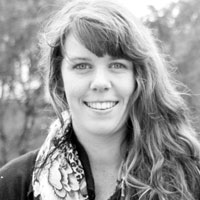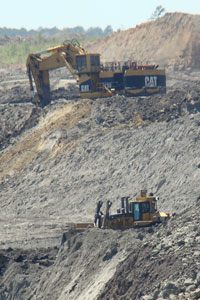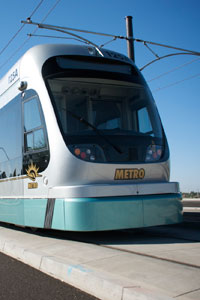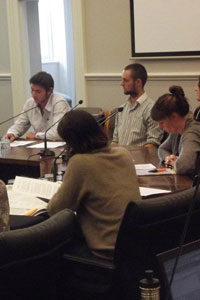Claudia Herron spoke with two members of the Dunedin contingent of Generation Zero, to find out about the movement, and to see what’s on the environmentally-friendly cards for 2012.

Tod Coxhead
Co-leader for Generation Zero DunedinTod Coxhead is that unparalleled type of leader, whose smooth demeanor immediately leads into an optimistic and forward-thinking outlook. A trendsetter in ambition and sustainability, he seamlessly stows his bicycle away ready to talk all things Generation Zero.
Tod first became involved in the movement after attending Generation Zero’s “Cheer Up Bob” lecture, which served up a plate of optimistic visions for the future to Director of Energy Studies Bob Lloyd, to moot his negativity about the world’s imminent demise. Says Tod, “Up to that point I hadn’t thought about how I could have an effect on this kind of scenario as an individual. I’d kind of always thought someone else would deal with it, or maybe I can’t do anything anyway, but seeing everyone there was really cool and it was this huge room of people and they’d pulled together this huge event all aimed at youth.” More than motivated, he went along to a meeting and joined the Generation. From modest beginnings Tod’s involvement in Gen Zero grew, and soon enough he emerged to co-lead the Dunedin branch along with Alec Dawson.
Generation Zero’s inception stemmed from the Youth Climate Delegation’s participation in the Copenhagen Negotiations in 2011. As Tod says, “All these other youth groups from around the world were all doing this cool stuff and the NZ guys were like, ‘we can do this stuff too, only better.’” The result was Generation Zero. Expanding to three branches in Auckland, Wellington and Dunedin, the national focus is one of inter-generational justice: “Every successive generation before us has scored a big technological event or something has gotten better. But for us, it seems like we’ll get to 50 or 60 and [the world] will be a whole lot worse” says Tod. However he is optimistic that this won’t transpire, and that implementing social change will allow people to take control of the situation.

Letisha Nicholas
Head of the Submissions groupLetisha has an intensely driven nature, which really showed through when she joined Gen Zero. While initially she may have felt a little lost, she soon found her feet and started taking on leadership positions. Her first role involved community networking and connecting: helping to get the word out about Gen Zero and what it did.
Now at the head of the submissions group, a role that she modestly says, has “fallen into my basket”, Letisha has already enjoyed success with submissions on the spatial plan (the Dunedin City Council’s long term planning document), “I came into the spatial plan halfway through, but it had so much momentum going and we just nailed it. The Mayor actually said thank you for a very comprehensive submission.”
Currently Letisha is organising her assault on the DCC’s recently released Long Term Plan and Annual Plan: “The basic form of submitting is just tick a box, fill in your name and that equals a submission. What we are doing is a bit up from that … [what we are saying is] ‘we want these things in, this is why and it relates to this part of the document.’” With that in mind, all of Gen Zero’s submissions draw heavily on community outcomes to emphasise what would have a positive effect on Dunedin. The Generation are looking for more bottom-up influence, and are especially concerned with some of the things left unfunded in the plan, such as strategic cycle networks, and networks to do with connecting the wider community. Submissions on the energy plan and eco-housing retrofit and other projects that directly relate to that are also being planned.
A major issue for Gen Zero is sustaining a connection with such an impermanent audience. “How do you get a population, highly in debt, really transient, and only here for a short space of time, involved at a local level [if] they don’t feel like they can contribute because they are not going to be here in 3 or 4 years?” Gen Zero’s aim is to change that mindset by getting people to “act locally and think globally.” For Letisha, being from the North Island and having only one more year left in Dunedin has not stalled her contribution to Gen Zero’s cause. “I know I’m doing good, even if it doesn’t feel like it sometimes.”
So what’s the plan?
Generation Zero’s main focuses for 2012 include campaigning against Solid Energy’s proposed lignite plants in Southland, contributing to the nationwide campaign on public transport funding, and developing a relationship with the DCC to have an input in how the city is run.
Lignite
While Tod admits that “the campaign hasn’t been completely defined” yet, a meeting with all interested groups is planned, with Gen Zero’s course of action to hopefully be settled soon. Converting lignite to diesel produces almost double the emissions produced by burning diesel refined from oil. If NZ goes ahead with its planned lignite mining the country risks overshooting its Kyoto Protocol commitment to reduce emissions by 20% by 2020. “If we want to go to a zero carbon emission plan, and we have no more coming out than is going back into the system, then we can’t be burning coal. It is also not very necessary in terms of power, 70% of NZ’s power is renewable already.”Gen Zero are convinced that lignite mining is unnecessary, and believe that Solid Energy are likely to simply export the lignite. In the meantime, Gen Zero have released a novel parody video in reaction to both Solid Energy’s plans and the “Marmaggedon” crisis. Entitled “Ligmite”, the video depicts Solid Energy releasing the eponymous lignite-based spread in lieu of producing diesel.

Public transport campaign
Government funding for transport is significantly skewed away from smart transport options, with roughly 40 times more funding being given to roads than public transport infrastructure. Over the next ten years, Tod says, “the government plans to spend $13 billion on roads and only $300 million on new public transport infrastructure.” The request? A 50/50 split on road and smart transport – but even if this isn’t attainable, developing a change in opinions is at least a start. Tod describes Gen Zero’s drive as “an intermediate campaign that is going to serve as a medium for our values as an organization.” The plan is to launch the campaign at the end of April, with a stunt that would “challenge the mindset” of people’s portrayal of public transport, presenting public transport as smart and sexy.




